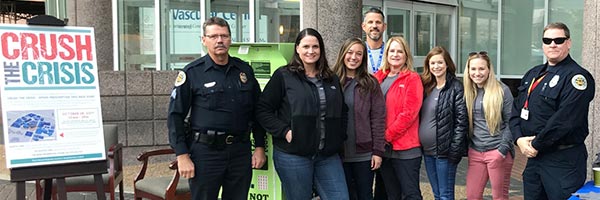
A passion for education and the development of new pain management strategies is driving a Nashville surgeon to do what he can to address the growing opioid abuse crisis in our community. After attending a pain management summit with other TriStar Medical Group physicians, Jeffrey T. Hodrick, MD, orthopaedic surgeon at Southern Joint Replacement Institute (SJRI), came away convinced there was more he and other medical providers could do to change behaviors that contribute to opioid abuse and addiction.
"As orthopaedic surgeons, we prescribe necessary pain management medications to aid in post-operative recovery," he said. "The majority of our patients are typically older adults who are recovering from a significant surgical procedure or joint replacement, and that requires thoughtful pain management strategies to enable mobility as soon as possible."
"What we can't know, is what happens to those prescription medications when the patient no longer needs them," he said. "The concern is a large number of patients hold on to their medications long after they are no longer needed, and they can fall into the hands of children or grandchildren."
National studies support Dr. Hodrick's concern, showing that prescription opioid use is a significant risk factor or gateway to heroin addiction. One such study conducted by the National Institute on Drug Abuse found that 86 percent of young, urban injection drug users had used opioid pain relievers non-medically prior to using heroin, and their three main sources for obtaining the opioids were family, friends or personal prescriptions.
"The problem is so big, deaths related to overdose now outpace deaths related to homicides, suicides and car accidents, claiming the lives of some 1600 Tennesseans last year," said Dr. Hodrick. "So as physicians, we have to ask ourselves, 'What can I do?'"
First, Dr. Hodrick and his colleagues are implementing pain management strategies that can effectively reduce the need to prescribe opioid medications for their orthopaedic patients.
"Changes in anesthesia that provide regional pain relief in the surgical site for a day or two post-surgery are important, and can change how pain is experienced by the patient in those first hours when we are trying to get them up and walking on a new joint," he said. "And a multi-modal pain management approach that includes anti-inflammatory medications combined with non-narcotic pain medications is proving to be very effective for significantly lowering the pain level, while still allowing the patient to regain function."
In fact, according to Dr. Hodrick, eliminating or significantly reducing the use of opioid medications for pain management can actually enhance recovery time, without the negative side effects often experienced with the opioid prescriptions.
Another technique for reducing the use of opioid prescriptions is switching from the long-used pain scale, to functional pain scores. "If a patient is able to be functional post-surgery, then they probably don't need narcotic pain medication, or they can function well and recover with less medication," said Dr. Hodrick.
Above all, patient and public education about the importance of properly disposing of unused medication are key to breaking the chain of abuse. Most prescription medications have instructions for disposal or you can check with your pharmacist if the information is not provided.
SJRI and TriStar Centennial Medical Center participated in the US Justice Department and Drug Enforcement Administration's (DEA) National Prescription Drug Take Back Day on Saturday, October 28. Nashville residents were able to drop off unused opioid prescriptions anonymously at TriStar Centennial Medical Center's "Crush the Crisis" event for the medicine to be disposed of properly with the assistance of the Metro Nashville Police Department.
According to Sgt. Klotzback of the Nashville Metro Police Department, the effort resulted in the collection of 21.5 lbs of medication, one of the best Nashville take back events held to date.